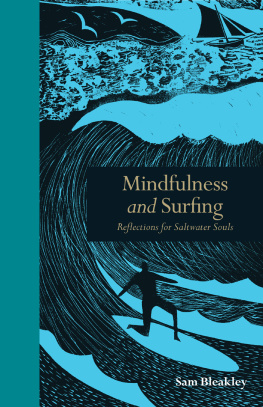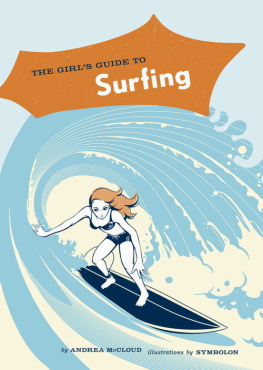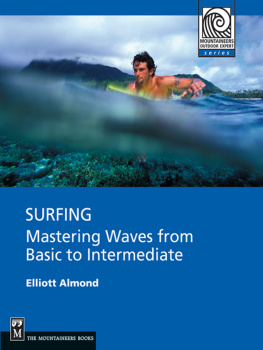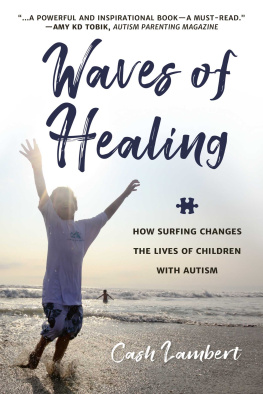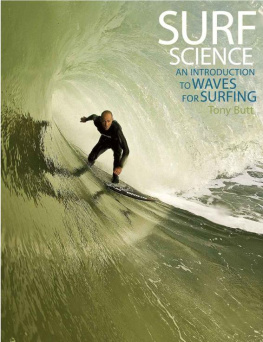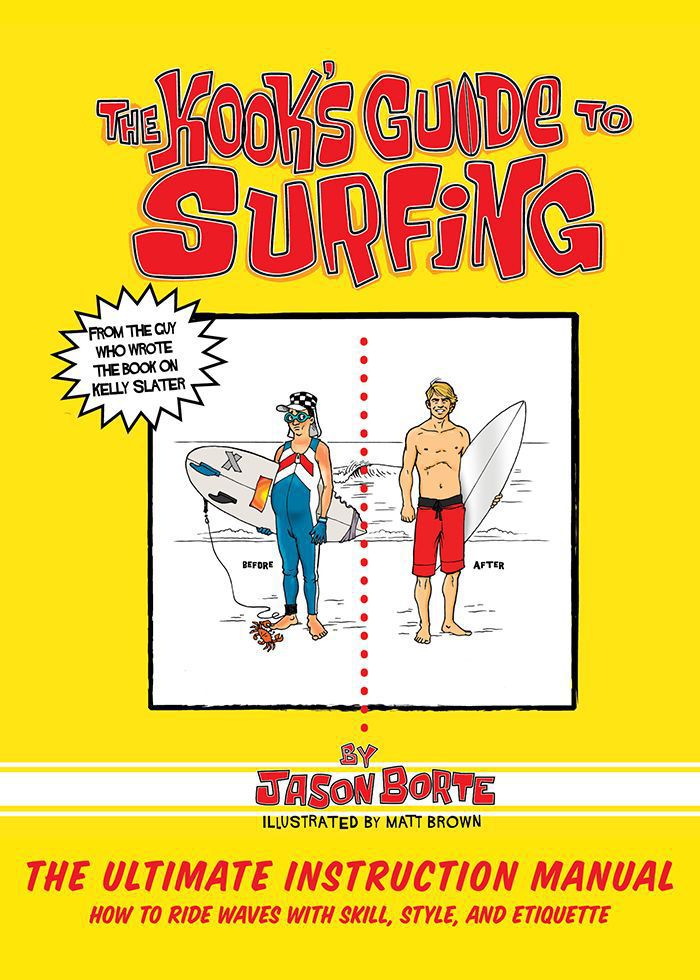THE KOOKS GUIDE TO SURFING
ThE ULTIMATE INSTRUCTION MANUAL: HOW TO RIDE WAVES WITH SKILL, STYLE, ETIQUETTE, AND FUN
Jason Borte
ABOUT THE AUTHOR

Jason Bortes first book, Pipe Dreams:A Surfers Journey (HarperEntertainment 2003), appeared on the New York Times bestseller list for hardcover nonfiction. A former editor for Surfer, Surfing, Explorations, and Swell.com, he has also written features for Eastern Surf, Transworld Surf Business, Water, Mundo Rad, Flow (Japan), Tripsurf (France), Adrenalin (England), and Australian Surfing Life. Most recently, his work appeared in The Mountain and the Wave, The Quiksilver Story (Chronicle 2006), The Best of Surfer Magazine (Chronicle 2007), and Pipeline: The Worlds Most Respected Wave (Surfline 2008).
One of the wittiest, most insightful voices in surfing is at it again. An essential read for kooks and kings alike.
Evan Slater, Editor, SURFING MAGAZINE, and big wave legend.
Jason Borte is something rare: a world-class surfer who writes as well as he rides waves. Hes also a gentleman, which means this book is infused with his compassionate sensibility. The central message: be considerate of your fellow surfers, kooks and non-kooks alike. I know many longtime surfers whod benefit from reading it.
Steve Hawk, Editor, SURFER MAGAZINE , and the guy who put Tony Hawk on a skateboard.
Jasons no kook, thats for sure If anyone can help you rise above the surfing worlds most touchingly humble status, he can.
Nick Carroll, Editor, SURFING MAGAZINE, and big brother of three-time world champion Tom Carroll.
ACKNOWLEDGMENTS
To Mom and Dad for being supportive of my habit. To Steve Hawk for the opportunity and guidance. To the guys who showed me how to not be a kook Wes, Pillsbury, Kochey, Quest, Cuppa Joe, MJ, Twig, Ken, Avery, Kliney, Cab, Neff, Greek, Brad, Brad, Jesse, Smitty, Jimbo, Jeff, and Zeke.
To Scott the Lifeguard, Amy Beach, Don Spencer, and Keegan for their work on this book. To KV, Geebs, Lil Ballurfin Momma, and the Hudster for keeping me honest.
And to Derrick for leading me to surfing and making me write this book.
Copyright 2013 by Jason Borte
All Rights Reserved. No part of this book may be reproduced in any manner without the express written consent of the publisher, except in the case of brief excerpts in critical reviews or articles. All inquiries should be addressed to Skyhorse Publishing, 307 West 36th Street, 11th Floor, New York, NY 10018.
Skyhorse Publishing books may be purchased in bulk at special discounts for sales promotion, corporate gifts, fund-raising, or educational purposes. Special editions can also be created to specifications.
For details, contact the Special Sales Department, Skyhorse Publishing, 307 West 36th Street, 11th Floor, New York, NY 10018 or info@skyhorsepublishing.com.
Skyhorse and Skyhorse Publishing are registered trademarks of Skyhorse Publishing, Inc., a Delaware corporation.
www.skyhorsepublishing.com
10 9 8 7 6 5 4 3 2 1
Library of Congress Cataloging-in-Publication Data is available on file. ISBN: 978-1-62087-723-4
Printed in the United States of America
TABLE OF CONTENTS
INTRODUCTION
Surfing has been around for thousands of years, and more people surf today than at any time in history. Recent estimates put the number of current wave riders in the neighborhood of twenty million. Participants come from every walk of life, age, color, religion, and socioeconomic status. Twenty million seems like a significant number until you consider that is only around 1/3 percent of all earthlings. To the rest of the worlds population, the other 99.7 percent, surfing remains misunderstood and misrepresented, and riding waves is considered a waste of time.
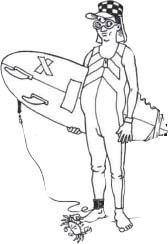
Who is to blame for surfings bad rap? I say its the kooks. In laymans terms, a kook is a person who is slightly off-the-wall, or something of a screwball. In surfing jargon, a kook really doesnt get it. Beginning surfers are considered kooks, but fortunately anyone can learn to surf. Having taught three-year-olds just out of diapers and seventy-year-olds soon to return to diapers, I truly believe that any able-bodied individual can learn to ride waves on his or her own. Developing proficiency in surfing marks step one on the road out of Kookville, but we cannot ride these mere skills off into the sunset. Plenty of avid, competent surfers remain full-fledged kooks. More than a novice at riding waves, a kook behaves in a manner that insults surfers and non-surfers alike. These people are oblivious to their transgressions and perpetuate surfings negative stereotype. Kooks are the bad apples that spoil the bunch.
One trait of a kook is overuse of the word dude. Society pigeonholes the speaker of this word as a surfer faster than screaming jihad marks one as a militant Muslim. A good friend of mine, a total landlubber, finds a way to fit dude into nearly every sentence he speaks. He does not surf, yet people wrongly label him as such. He gets branded as that surfer dude without ever dipping so much as his little toe in the surf.
The surfing stereotype was set in stone with Jeff Spi-coli, the quintessential stoned surfer played by Sean Penn in the 1982 teen epic Fast: Times at Ridgemont High. Of the thousands of surfers who I know, most only use the word dude to make a mockery of those who do. Nevertheless, if you surf, society assumes you have no real job, you make no money, and you spend your days hanging around the beach. I hate the beach, and the sun for that matter. I tolerate both as necessary evils in order to surf.
Thanks to the perpetuation of surfer as punk, loser, and burnout, surfing has been unable to rise above its lowly status. I, for one, do not believe that surfers are bums. Therefore, I set out a few years ago to change the surfer dude image. I contacted both the Dummies and Idiots guides about publishing a manual for the masses, a book that would explain not just surfing but how to be a surfer. Both the Dummies and Idiots declined, clinging to the old-school mentality that surfing was too unconventional to warrant the investment. Surfers, they assumed, do not read books. Whether surfers read books or not missed the point. Remember, 99.7 percent of the population does not surf.
Surfers cannot be herded into any category. They share an affinity for riding waves, but beyond that they go their separate ways. Unfortunately, since there are relatively few of us, we all automatically represent surfing. Our actions, good or bad, define surfing to outsiders.
In all the books I have seen on surfing (and there seems to be a new one published each week), I have not come across one that adequately explains how to be a responsible surfer as opposed to how to be a stereotypical surfer. These manuals overemphasize the spiritual and metaphysical aspects of communing with nature and fail to explain the process in simple terms, like you would with any other pursuit.



